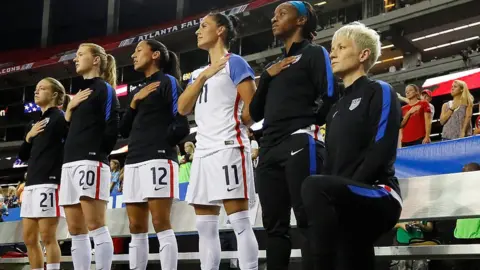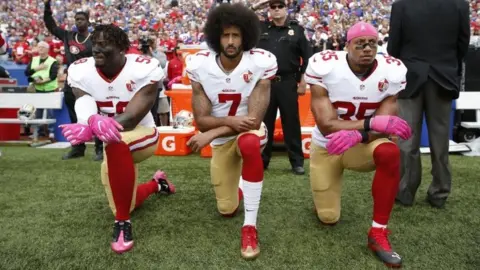George Floyd: US Soccer overturns ban on players kneeling
 Getty Images Sport
Getty Images SportUS Soccer has overturned a ban on football players kneeling during the national anthem.
The rule was introduced in 2016 after women's star Megan Rapinoe kneeled in solidarity with ex-NFL player Colin Kaepernick, who began kneeling during the anthem in protest against racial injustice.
The US Soccer board described its previous stance as "wrong".
The move comes amid worldwide protests over the death of George Floyd.
Floyd, an unarmed black man, died in police custody in Minneapolis last month. His death has brought a renewed focus to the issue of racism and police brutality.
In a statement, the US Soccer Federation said taking a knee was a form of protest against "police brutality and the systematic oppression of Black people and people of colour in America".
Allow X content?
The decision to ban the gesture, it went on to say, "was wrong and detracted from the important message of Black Lives Matter."
On Saturday, the National Football League (NFL) overturned its own ban on players kneeling.
Taking a knee has been used in many protests since Floyd's death.
NFL quarterback Colin Kaepernick began kneeling at the start of matches in 2016, saying at the time: "I am not going to stand up to show pride in a flag for a country that oppresses black people and people of colour."
He was later joined by a number of other players, before the NFL introduced a rule - later repealed - that teams would be fined if players refused to stand for the anthem.
 Getty Images
Getty ImagesKaepernick became a free agent after the 2016 season but remains unsigned. Kaepernick filed a grievance against NFL owners in October 2017, believing they were conspiring not to hire him because of his kneeling protests.
The two sides resolved the grievance in February under a confidentiality agreement.
US President Donald Trump has repeatedly called for players who kneel to be fired.

More on George Floyd's death
- VIEWPOINT: Tipping point for racially divided nation
- WATCH: 'This is why we are protesting'
- TIMELINE: Recent black deaths at hands of police
- BACKGROUND: Five pieces of context to understand the protests
- CRIME AND JUSTICE: How are African Americans treated?

